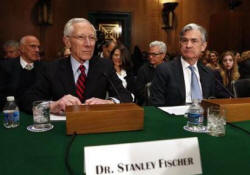|
 Fed
nominee Fischer: Policy decisions are best made early Fed
nominee Fischer: Policy decisions are best made early
 Send a link to a friend
Send a link to a friend
[March 15, 2014]
By Ann Saphir
PALO ALTO, California (Reuters) — Stanley
Fischer, U.S. President Barack Obama's pick for the No. 2 job at the
Federal Reserve, said on Friday that decades of crisis-fighting have
taught him the importance of making policy decisions quickly, even
before all relevant data is in hand.
|
|
 "We tend to underestimate the lags in receiving information and
the lags with which policy decisions affect the economy," he said in
remarks prepared for delivery to the Stanford Institute on Economic
Policy. "We tend to underestimate the lags in receiving information and
the lags with which policy decisions affect the economy," he said in
remarks prepared for delivery to the Stanford Institute on Economic
Policy.
"Those lags led me to try to make decisions as early as possible,
even if that meant that there was more uncertainty about the
correctness of the decision than would have been appropriate had the
lags been absent."
Fischer was in California to receive the institute's $100,000 prize
one day after his nomination hearing in Washington, a session that
shed little new light on his policy leanings but suggested he is
largely supportive of the Fed's current super-easy monetary policy.
He is expected to win Senate confirmation, although the timing is
unclear.
His comments Friday came in a speech titled "Lessons from Crises,
1985-2014," billed as a set of remarks about the past rather than
reflections on current events.

Still, his inclusion of this particular lesson, number eight on his
list, may suggest an inclination to act rather than to wait in the
face of uncertainty.
That could be a critical insight into the thinking of a man likely
soon to become the most influential U.S. central banker after Fed
Chair Janet Yellen, just as the Fed faces the unprecedented task of
unwinding its extraordinary stimulus measures launched in the depths
of the last financial crisis.
Yellen convenes her first policy-setting meeting as Fed chair next
week. Policymakers are expected to continue to reduce their
bond-buying program with a view to winding it down before the end of
the year. They are also expected to give investors a clearer idea
of when they eventually will start to raise rates, after keeping
them near zero since December 2008 to encourage investment and
spending. By telegraphing their intentions as best as possible to
markets, Fed policymakers hope to make the transition to the first
U.S. tightening cycle in a decade as smooth as possible.
[to top of second column] |

At 70, Fischer is anything but an impetuous decision-maker. An
economics professor for many years, he taught both former Fed Chair
Ben Bernanke and European Central Bank chief Mario Draghi.
He spent seven years as the No. 2 official at the International
Monetary Fund during the Asian financial crisis, and headed the Bank
of Israel from 2005 until the middle of last year. In that role, he
was known for making decisions on interest rates that sometimes took
markets by surprise.
On Friday he recounted one rate decision he faced in his early days
at Israel's central bank.
He decided to keep the rate unchanged until the following month, he
recalled telling his advisers, when the situation would be clearer.
"It is never clear next time; it is just unclear in a different
way," came the response from his second-in-command.
And so, Fischer said Friday, he learned his lesson: "don't
overestimate the benefits of waiting for the situation to clarify."
(Reporting by Ann Saphir; editing by Ken Wills)
[© 2014 Thomson Reuters. All rights
reserved.] Copyright 2014 Reuters. All rights reserved. This material may not be published,
broadcast, rewritten or redistributed.
 |